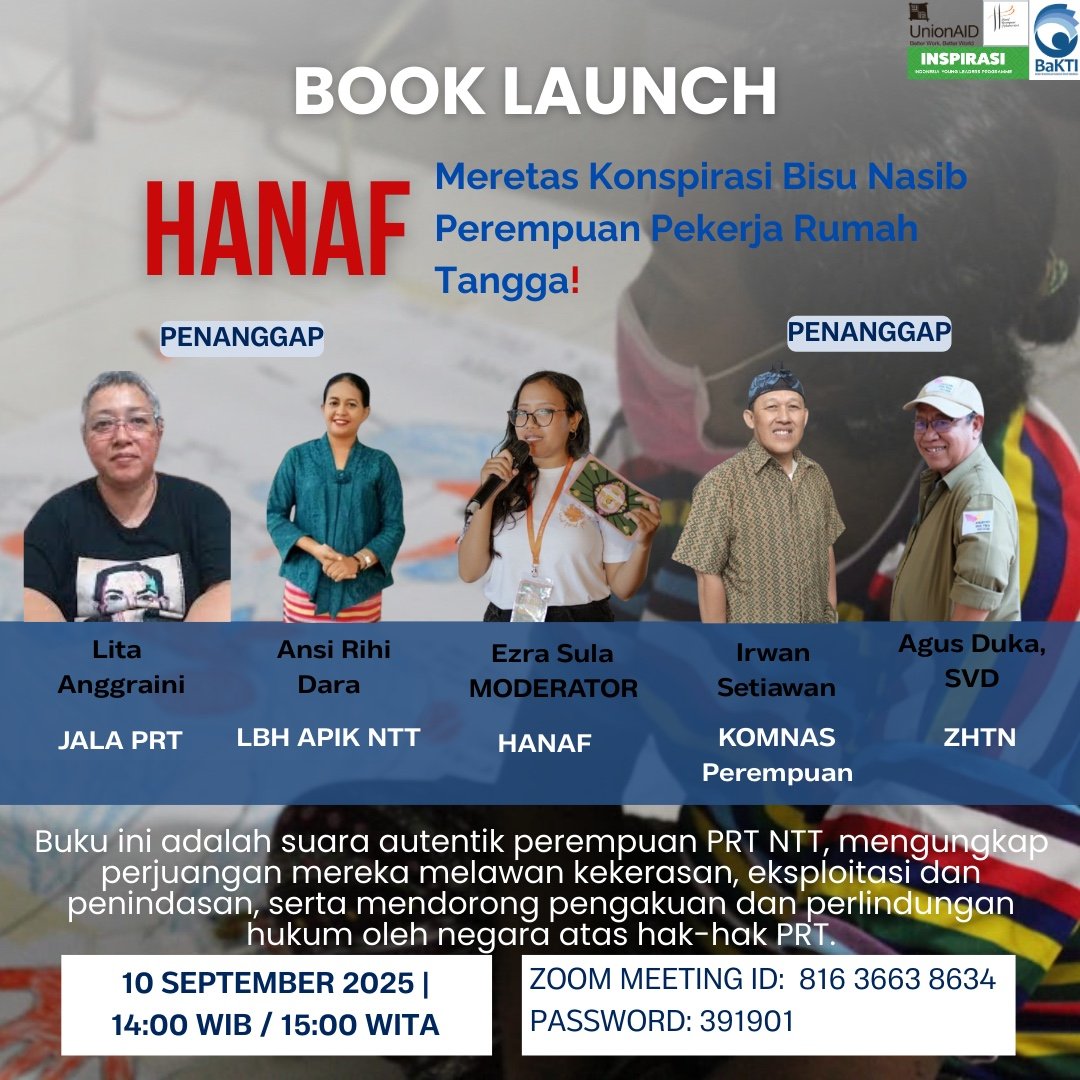
September 10, 2025, marked a significant milestone for Perkumpulan Hanaf Perempuan Flobamoratas (PHPF), or the Flobamoratas Women Hanaf Network, with the publication of its first book, HANAF: Breaking the Silent Conspiracy of Women Domestic Workers. The book is the result of five years of documenting eleven life stories of women domestic workers from East Nusa Tenggara Province (NTT), during which we overcame numerous challenges throughout the process. As one quote in the book states, “One small step is also an important progress that should be celebrated.” The publication of this book is a meaningful contribution to Indonesia’s domestic workers’ rights movement, which has been active for over twenty years. The workers’ stories are powerful voices that have long been silenced. The book also calls on the Indonesian House of Representatives to pass the RUU PPRT (Rancangan Undang-Undang Pelindungan Pekerja Rumah Tangga), a bill that would provide legal protection for domestic workers in Indonesia.
The initiative to publish HANAF emerged from the long-standing fight against human trafficking in NTT over the past few decades. Countless stories of violence and exploitation faced by domestic and migrant domestic workers, some even ending in femicide, have left deep trauma for the workers and their families. Using five Participatory Action Research (PAR) methods, namely interview, timeline, body mapping, memory box, and postcard, eleven women participated in the research, sharing their experiences of working at local, national, and international levels. Through this process, ten out of the eleven narratives were publicly shared for the very first time.

Four prominent speakers from activist and religious backgrounds were invited by PHPF: Lita Anggraini (National Advocacy Network of Domestic Workers or Jala PRT), Ansi D. Rihi Dara (Indonesian Women’s Association for Justice Legal Aid Institute of NTT or LBH Apik NTT), Irwan Setiawan (National Commission on Violence Against Women or Komnas Perempuan), and Romo Agus Duka (Zero Human Trafficking Network or ZHTN). More than thirty participants attended the discussion, representing various backgrounds such as domestic workers, activists, students, religious leaders, and journalists. The speakers and participants expressed their deep appreciation to PHPF for its dedication in documenting the authentic voices of domestic workers. The speakers also praised the eleven women for their courage in sharing their stories and confronting a lifetime of exploitation and violence. One participant, Maria Seran from Lakoat.Kujawas, said, “An appreciation goes to the PHPF’s team and friends who work very hard to produce this outstanding book.”
During her session, Lita Anggraini emphasized that every stakeholder, including religious leaders, activists, domestic workers, and civil society, must continue to fight for justice, even though challenges are unavoidable. It cannot be denied that workers’ voices are silenced in their employers’ houses. She also encouraged the formation of a domestic workers’ union in NTT, explaining that a domestic worker union will establish a stable power to fight for decent work.
Agung Setiawan criticized the authorities for their slow response in passing the RUU PPRT, despite the many cases domestic workers continue to face. According to Komnas Perempuan, over the past five years (2019–2024), more than 2,000 cases of violence against domestic workers have been reported through direct grievance mechanisms and grassroots networks. Based on these findings, Komnas Perempuan stated that justice for domestic workers cannot be postponed. The ongoing discussion on the RUU PPRT must be concluded immediately, prioritizing the workers’ perspectives and needs.
Ansi Rihi Dara explained the connection between domestic workers’ issues and a cultural practice in NTT known as anak tinggal (Javanese: ngenger). This custom involves young people migrating from their home villages to the city to continue their education at middle school while living with extended families or foster parents. Unfortunately, many fail to continue their studies due to the various forms of exploitation and violence they experience in these households. The long-term consequences for these uneducated individuals include systemic poverty, child marriage, and domestic violence. Ansi also emphasized Agung Setiawan’s statement about strengthening legal enforcement to protect domestic workers, both nationally and locally.
Romo Agus Duka urged religious leaders to stand with those who have been marginalized by systemic poverty perpetuated by the Indonesian government. “Prioritise those who are abandoned,” he said, encouraging religious leaders to be more socially engaged. He stressed, “It is not necessary to be an angel in heaven, but it is better to be a good person on this planet.” His message reminded religious leaders, especially Christians, to take concrete action in demonstrating love and compassion for others.
A participant from IJMI, Guster Sihombing, shared his positive response: “Congratulations and success for this book publishing! Thanks to Rev. Emmy Sahertian and the courageous women who have shared their life experiences. Hopefully, this book can be the first step of a great transformation ahead, as well as a gateway for other workers to speak up and have their voices heard publicly.” Another encouraging response came from Rev. Dini Sole of GMIT, who said, “We can hear the workers’ voices and take part in promoting justice in our workplaces.” Both statements highlight the book’s important contribution to the domestic workers’ movement in Indonesia.
In closing, I would like to express my sincere gratitude to BakTI and UnionAID for their funding and for giving me a second opportunity to work on the project Nnen Hai Hanaf (Listen to Our Voices), as part of my action project under the INSPIRASI Programme. My heartfelt thanks also go to my friends at PHPF for their strong commitment to this project, and to the courageous women domestic workers who have passionately and bravely shared their life experiences. Solidarity Forever!
The book HANAF can be accessed through PHPF’s social media platforms: Instagram (Hanaf_Suara), Facebook (Komunitas Hanaf), WhatsApp (+62 823 4148 2871), and email (komunitashanaf801@gmail.com).
*This narrative is written by Yuliana M. Benu, INSPIRASI alum year 2019. This event is part of Yuli's action project
